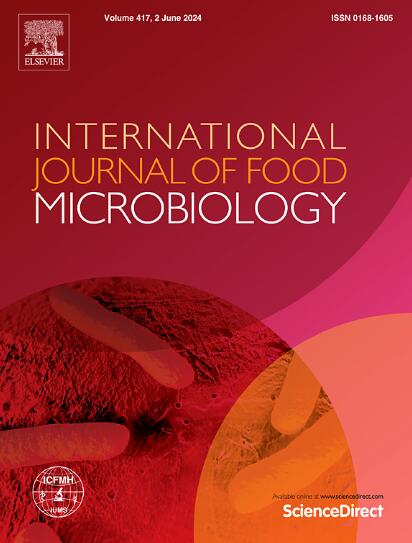发酵乳的后酸化及其分子调控机制
IF 5
1区 农林科学
Q1 FOOD SCIENCE & TECHNOLOGY
International journal of food microbiology
Pub Date : 2024-09-19
DOI:10.1016/j.ijfoodmicro.2024.110920
引用次数: 0
摘要
含有乳酸菌(LAB)的发酵乳制品被消费者广泛接受。在冷链运输和储存过程中,产品中的乳酸菌会不断产生乳酸,从而导致后酸化,影响产品的风味、消费者接受度甚至货架期。酵母菌是影响后酸化的决定性因素。LAB 的产酸途径和抑制后酸化的方法受到广泛关注。本综述将从发酵起始菌的角度重点介绍后酸化,包括 LAB 的产酸途径、影响后酸化的主要因素和关键酶。保加利亚乳杆菌(Lactobacillus delbrueckii subsp.不同的菌种和菌株在产酸、耐酸和后酸化等过程中存在各种差异。此外,牛奶成分、发酵温度和均质化等多种因素也会影响后酸化。乳糖的运输和利用途径及其后续产物的代谢途径直接影响后酸化。F0F1-ATP 酶、β-半乳糖苷酶和乳酸脱氢酶被认为是与后酸化有关的重要酶。后酸化的程度主要与发酵引发剂的产酸能力和耐酸能力有关,因此与后酸化有关的关键酶大多参与这两种能力的作用。最近发现了一些新的后酸化相关生物标记基因,为在不影响发酵速率和菌体活力的前提下调整后酸化提供了参考。从分子水平阐明后酸化机制将有助于控制后酸化。本文章由计算机程序翻译,如有差异,请以英文原文为准。
Post-acidification of fermented milk and its molecular regulatory mechanism
The fermented milk products with lactic acid bacteria (LAB) are widely accepted by consumers. During the chilled-chain transportation and storage, LAB in the product keep producing lactic acid, and this will lead to post-acidification, which can affect the flavor, consumer acceptance and even shelf-life of the product. LAB is the determining factor affecting post-acidification. The acid production pathway in LAB and methods inhibiting post-acidification received widespread attention. This review will focus on the post-acidification from the perspective of fermentation starters, including acid production pathway in LAB, main factors and key enzymes affecting post-acidification. Lactobacillus delbrueckii subsp. bulgaricus is a key bacterial species responsible for post acidification in the fermented milk products. The different species and strains presented various differences in process like acid production, acid resistance and post-acidification. Furthermore, multiple factors, such as milk composition, fermentation temperature, and homogenization, also can influence post-acidification. Lactose transport and utilization pathways, as well as its subsequent products metabolic pathway directly influence the post-acidification. F0F1-ATPase, β-galactosidase, and lactate dehydrogenase are recognized as important enzymes related to post-acidification. The degree of post-acidification is mainly related to the acid production and acid resistance abilities of the fermentation starters, so the key enzymes related to post-acidification are mostly taking part in these two capacities. Recently, some new post-acidification related biomarker genes were found, providing a reference adjusting post-acidification without affecting fermentation rate and bacteria viability. To clarify the post-acidification mechanism at the molecular level will help control post- acidification.
求助全文
通过发布文献求助,成功后即可免费获取论文全文。
去求助
来源期刊
CiteScore
10.40
自引率
5.60%
发文量
322
审稿时长
65 days
期刊介绍:
The International Journal of Food Microbiology publishes papers dealing with all aspects of food microbiology. Articles must present information that is novel, has high impact and interest, and is of high scientific quality. They should provide scientific or technological advancement in the specific field of interest of the journal and enhance its strong international reputation. Preliminary or confirmatory results as well as contributions not strictly related to food microbiology will not be considered for publication.

 求助内容:
求助内容: 应助结果提醒方式:
应助结果提醒方式:


